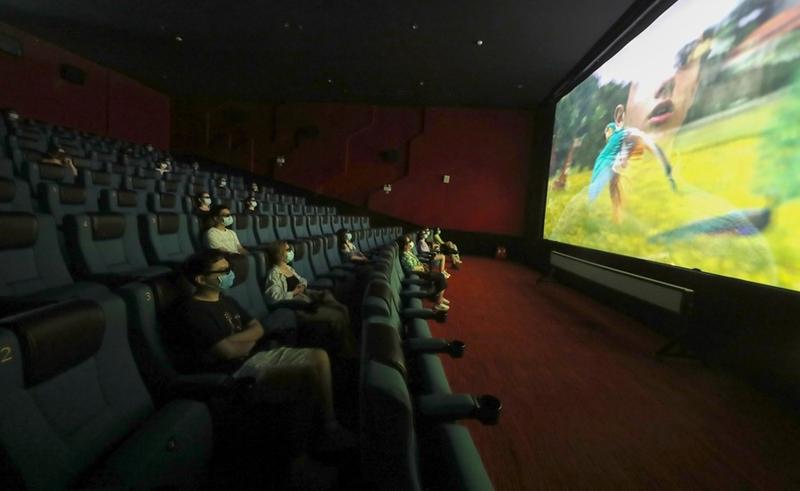China's film industry shows early signs of recovery as cinemas reopen amid the pandemic, Xu Fan reports.
 A Beijing cinema reopens on July 24, after being closed for 182 days due to the pandemic. (DONG YIMING / FOR CHINA DAILY)
A Beijing cinema reopens on July 24, after being closed for 182 days due to the pandemic. (DONG YIMING / FOR CHINA DAILY)
The rise in box-office takings last weekend indicates a sign of recovery for China's film industry, with more than half of the country's cinemas reopening after a six-month closure due to the COVID-19 pandemic.
As of Thursday, 6,066 of more than 10,000 cinemas had reopened, accounting for 55.3 percent of all such venues in China, which has nearly 70,000 screens-the most in the world, according to Beacon, the movie-information tracing service of Chinese internet giant Alibaba.
After the outbreak is completely contained, I believe filmmakers will be able to make films more suitable for being shown on the big screen
Jia Zhangke, director
From July 24 to 26, China's box office grossed nearly 93 million yuan (US$13.3 million), more than four times the total amount earned from July 20 to 23, propelling the first relaunch week to gross over 100 million yuan.
Over the past six months, thousands of Chinese cinemas struggled to survive, with some shifting to selling snacks and drinks online or renting venues for other services, such as wedding-photo shoots.
More than 30 old films are set to be screened, and all ticket revenues will go to theaters instead of being shared with movie companies as is the norm in China. The effort is to ease the financial difficulties of cinemas, according to China Film Group Corp and Huaxia Film Distribution, two of the country's largest State-owned movie companies.
Drawing audiences back to cinemas is a top concern among many industry insiders.
 Cinemas take strict disinfection measures in Wuhan, Hubei province. (XIAO YIJIU / XINHUA)
Cinemas take strict disinfection measures in Wuhan, Hubei province. (XIAO YIJIU / XINHUA)
China Film Administration's guidelines for resuming theater operations under the COVID-19 prevention protocol require audiences to book tickets online in advance, wear masks inside venues and not eat or drink during screenings, which are limited to two hours each.
Beacon's figures show that movie-theater attendance reached nearly 4.2 million visits last week.
Li Jie, president of Alibaba Pictures, says he's delighted to see audience interest is returning.
"The following two weeks will be very important for the recovery of the market. We estimate that box-office revenues will rise to around two-thirds of the amount in the same period last year," says Li.
 Cinema visitors check in with their cellphones in Guangzhou on July 20. (LU HANXIN / XINHUA)
Cinema visitors check in with their cellphones in Guangzhou on July 20. (LU HANXIN / XINHUA)
Most of the films being screened are classics or previous runaway hits, including the Chinese crime drama Sheep Without a Shepherd, Oscar winner Coco and China's all-time highest-grossing animated title, Ne Zha.
But figures show that audiences are more willing to return to cinemas for fresh content.
Dolittle, Robert Downey Jr's first film since he left Marvel superhero films as the iconic character Iron Man, topped the weekend box office in China, followed by sci-fi action film Bloodshot, starring Vin Diesel. The two Hollywood films were scheduled to be released in China in February but were delayed due to the pandemic.
A First Farewell, showing the Xinjiang Uygur autonomous region's natural scenery through the perspective of three children, and the documentary Bright Torch, which tells the story of artisans, are the only two new Chinese films released on July 20, the first day Chinese cinemas in low-risk areas were allowed to reopen.
 Sheep Without a Shepherd. (PHOTO PROVIDED TO CHINA DAILY)
Sheep Without a Shepherd. (PHOTO PROVIDED TO CHINA DAILY)
More blockbusters are on their way to "flood" Chinese theaters in the following weeks. Among them are several Oscar winners, including the satirical fantasy Jojo Rabbit, the biographical drama Ford v Ferrari and World War I epic 1917.
More classics will be screened in August, such as director Christopher Nolan's sci-fi film Interstellar and Harry Potter and the Sorcerer's Stone, the first movie of the eight-installment Harry Potter franchise.
Audiences will see more new domestic films by the end of summer, once a lucrative box-office season. The noir animated flick Mr Miao and the romance The Enigma of Arrival will open on Friday, followed by Wild Grass and Love You Forever-two romances tailored for Qixi, the Chinese equivalent of Valentine's Day, on Aug 25.
According to Imax China, 369 of its more than 700 screens had resumed operation by Sunday. The company aims to have 600 screens open by mid-August.
 Love You Forever. (PHOTO PROVIDED TO CHINA DAILY)
Love You Forever. (PHOTO PROVIDED TO CHINA DAILY)
Fu Ruoqing, chairman of Huaxia Film, says during an online forum of the ongoing 23rd Shanghai International Film Festival that the pandemic's impact on the global film industry is serious, but the situation is also pushing the industry to seek solutions to lower risks in the future.
An annual report on China's film and television industry released by Beacon estimates China's film industry is suffering a financial loss of about 50 billion yuan, based on big data analysis of box-office growth over the past years. The film industry was in a slowdown mode before COVID-19, and its annual box-office growth in 2020 was estimated to be up only 4.4 percent year-on-year, or 67.1 billion yuan, without the outbreak.
Fu says the crisis has inspired domestic studios to consider more cooperation with streaming sites as a major platform to release movies aside from cinemas.
"China produces on average around 700 feature-length drama movies annually, but half of them can't be screened in theaters," he says.
 Dolittle, starring Robert Downey Jr. (PHOTO PROVIDED TO CHINA DAILY)
Dolittle, starring Robert Downey Jr. (PHOTO PROVIDED TO CHINA DAILY)
Theater managers usually want to screen blockbusters, making indie and art-house films-most of which have limited budgets-less viable box-office contenders, Fu explains, adding that streaming sites can become a good alternative for such films.
Motion Picture Association of America China president Feng Wei says at the same forum the development of streaming has helped the global film industry during the pandemic as the gap between theatrical and online release has been reduced, indicating that diversified viewing models will be a trend.
China's online-video viewers reached 850 million by March, accounting for 94.1 percent of all netizens in the country, according to a report released during the Shanghai Internet Summit.
 A First Farewell. (PHOTO PROVIDED TO CHINA DAILY)
A First Farewell. (PHOTO PROVIDED TO CHINA DAILY)
But for movie buffs, the charm of the silver screen will never fade and the experience of sitting in a cinema to watch a film is irreplaceable.
"After the outbreak is completely contained, I believe filmmakers will be able to make films more suitable for being shown on the big screen. Cinemas had disappeared from our lives for more than 100 days, enabling filmmakers to think more deeply about the unique beauty of cinemas and the special nature of the film medium," director Jia Zhangke says during an online masterclass at the Shanghai film festival.
Contact the writer at xufan@chinadaily.com.cn


